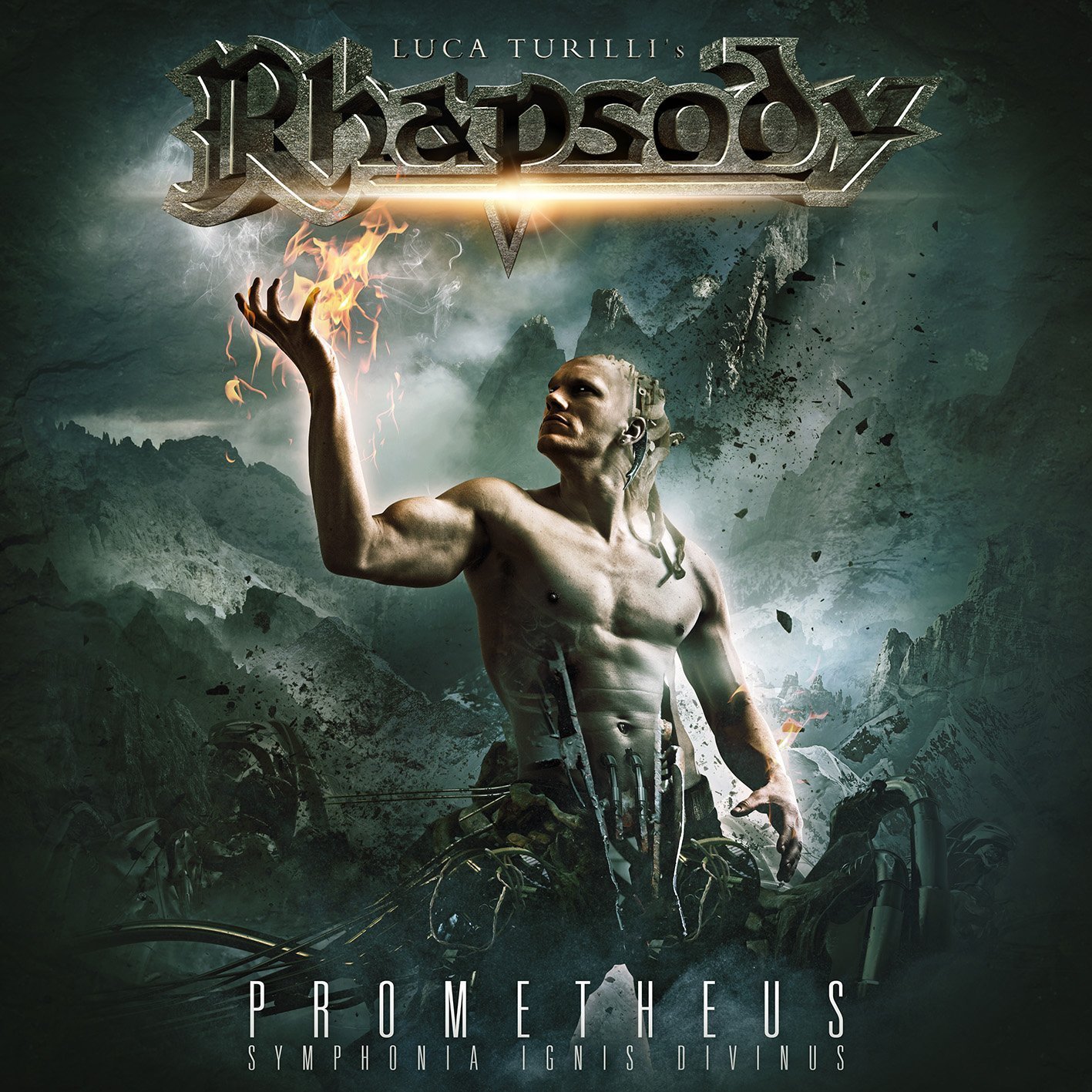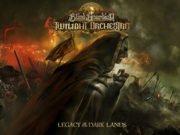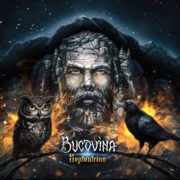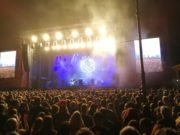
Luca Turilli’s Rhapsody, Prometheus, Symphonia Ignis Divinus
Posted on: July 7, 2015 at 8:24 am
Let’s get this out of the way: yes, it’s Rhapsody of fire 2.0 and if you were expecting anything else, then you haven’t been paying attention. As the brain and soul behind the Italian power band, it was pretty obvious that Turilli will create a more Rhapsody-sounding album than the current Rhapsody did, but while the band played it safe and put out a decent, but not very imaginative and bold album, Turilli went all out and turned “epic” into a religion. And speaking of religion, the album touches major religious/mythical motifs, starting from the Genesis, going through Ancient Greece and old-Testamental Israel and ending with Lord of the rings (yes, it has been officially promoted to religion :P) and if you think the titles and themes are bombastic, wait till you get to the actual music!
Obviously, the album opens up in an epic way with Nova Genesis, but as opposed to all the bands who are doing grandiose intros because it’s cool, Turilli is doing it because “mighty” is his middle name. There’s a little techno/electronic touch reminiscent of his Dreamquest era, but for the most part it’s the symphonic power metal you’ve come to expect from him.
The next four tracks, Il Cigno Nero, Rosenkreuz, Anahata and Il Tempo Degli Dei are again typical Rhapsody of fire, with fast paced, positive and slightly cheesy power instrumentals, melodic choruses, monumental choirs and of course, an excellent tenor. When the Luca Turilli/Fabio Lione wonder duo split, I was afraid we were going to have another Iced Earth/Ashes of Ares situation, with an excellent songwriter without a voice to match on one side and an excellent vocalist without a composer to match on the other side. The jury is still out on Rhapsody’s songwriter, but Luca found a brilliant replacement for Fabio in Alessandro Conti’s person. This guy is great! He was my favourite part in Ascending to infinity and he’s still my favourite part in Prometheus, Symphonia Ignis Divinus, even though the rest is not half bad either. With a crystal clear voice that reaches amazing heights and a ton more emotion than I ever heard from Fabio (who’s definitely not a cold unemotional singer either), Conti has stolen my heart. Usually, the more you train the voice, the more you take away from it’s individuality and emotion, and Conti is clearly trained and mega-trained, but somehow he still retained his personality and gentleness, which is beautiful. And of course, the Italian language seems to have been made especially for power metal. Or power metal for Italian.
There’s something very interesting about Turilli’s music, it’s a music of contrasts. He’s as serious as he could be, and yet the mood is very positive and light (and it’s not because they are the kings of non-lame cheese). The rhythms and melodic lines are simple and straightforward, and yet the keyboards that Nightwish later stole, the violins and the flamenco guitar are absolutely gorgeous and there is so much complexity in the way the choirs and instruments are used, as they complement the metal instruments. His name is basically synonym with “symphonic metal” and yet his symphonic influences are so differently used when you compare him with the rest of the bands in the genre. Most bands have this soundtracky approach and use the choirs and orchestras in a more contemporary way. Turilli, however, is as classic as he can be, as even the guitar solos follow classical motifs and I’m not even going to mention the orchestra, which is straight out of the 18th century.
Still, no matter how grand and melodic and beautiful the songs are, by the middle of the album I’m ready for a change of pace and something we haven’t heard at least 10 albums before. And the change comes in the form of One ring to rule them all, which is by far the best track of the album in my opinion. It’s not exactly a huge transformation, it’s still joyful cheesy power metal, dressed with heroic choirs and violins, but first of all it’s even more epic and than the previous tracks (I know, I didn’t think it possible either), with the warrior choirs in the language of Mordor, followed by the gentle beautiful bridge and jolly medieval keyboard solo and that amazing high note (did I mention I love Alessandro Conti?). Second, there’s nothing that says inspiring music than being able to guess the theme of the song from simply listening to it without paying attention to the lyrics. And from the first few seconds, I could’ve sworn this is inspired by LOTR, it simply screams it’s from the same story and that’s great.
After the best track comes the second best, Notturno, a gorgeous gorgeous duet between Conti and Emilie Ragni, a very talented classically trained soprano. It’s a song that simply gives you the goose bumps and which, if it weren’t for the timid drums, you wouldn’t even know it’s from this century. Notturno is pure Italian opera and the growth and explosion in the middle especially are absolutely beautiful.
I’m still at lost as to why a song titled Prometheus talks about telepathic contact, quantum nexus, human cyborgs and alien foetus (or why any Rhapsody song deals with these topics, for that matter), but that’s pretty much all I can say about this track. You know, power, orchestra, a terrific Conti, epicness… pretty much the standard Luca Turilli package. You know, except for the cyborgs.
King Solomon And The 72 Names Of God proves that not only bombastic beginnings are in style, but also oriental metal. It’s a music straight out of Ancient Egypt, but heh, I can’t complain. I love the oriental music + heavy metal combination and it will take ages before it gets old for me. Turilli rarely composes more aggressive music, but apparently when he does write it, he writes it good. Also, it’s a real joy to hear him use minor tonalities for a change, even though he quickly gets back to his bright major keys.
Yggdrasil is a lovely dreamy story-like track, with an epic growth and with an amazing guitar used in a less conventional way, like a violin. The chorus is incredibly catchy (I’ll probably be singing “faith of Asgard” for days to come), but what tops it all is the trio of kickass solos (keyboards, acoustic guitar and electric guitar) that follow one another near the end of the song.
Finally, the mandatory epic of this album, that continues the story of the mandatory epic from the previous record, Of Michael The Archangel And Lucifer’s Fall Part II: Codex Nemesis. I’m sad to say, though, that it’s all rather anti-climatic. I expected more from an 18 minute song, but almost half of the 18 minutes constitute of an ending that never actually ends. I keep waiting for it to become silent and yet it keeeeps on going unnecessarily. Also, I would’ve imagined an 18 minute song had more variation, more growth, more changes of pace and atmosphere. This one changes a bit, but it keeps coming back to good old Rhapsody. And now matter how much I love the band, when the whole album is made of epic bombastic tracks, you set a very high standard for such a lengthy track and this one simply doesn’t reach it.
I was advising in the beginning to not kid yourself, as Luca Turilli’s Rhapsody is as Rhapsody-of-fire-ish as it could be. It was actually Luca Turilli’s Rhapsody to begin with, literally. But where the new Rhapsody album fails, this one keeps the bar high, as it continues to innovate (even though the innovation mostly consists of “bigger, mightier, Luca Turilli”) and doesn’t settle for less. Where Dark wings of steel was contained and eventually became rather redundant, Prometheus, Symphonia Ignis Divinus may not be the boldest and eclectic album, but it’s still fresh and creative and full of life and shows willingness to grow and improve.





Be the first to comment on "Luca Turilli’s Rhapsody, Prometheus, Symphonia Ignis Divinus" !